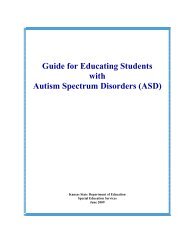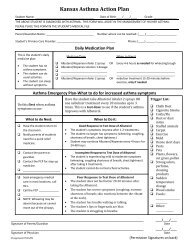People make it happen(PDF)1 - Families Together Inc.
People make it happen(PDF)1 - Families Together Inc.
People make it happen(PDF)1 - Families Together Inc.
Create successful ePaper yourself
Turn your PDF publications into a flip-book with our unique Google optimized e-Paper software.
others and sisters, especially those close in age to the<br />
individual, can provide information that relates more<br />
closely to the individual’s peer group.<br />
Family members who play important<br />
roles in trans<strong>it</strong>ion planning include<br />
parents, brothers and sisters, and<br />
extended family members (e.g.,<br />
grandparents, aunts, uncles). <strong>People</strong> who<br />
are not relatives, but who are regarded as<br />
“family” by the student such as foster<br />
parents, friends, and guardians are also<br />
included in this category. Family members<br />
have a great deal of insight and information<br />
that enhances the trans<strong>it</strong>ion process.<br />
They are the people who will be involved<br />
w<strong>it</strong>h the student throughout his or her<br />
lifetime and know the most about the student’s<br />
history, strengths, and needs.<br />
Because of this, family members are v<strong>it</strong>al<br />
members of a trans<strong>it</strong>ion team; w<strong>it</strong>hout<br />
their support and participation in meetings<br />
and informal discussions, a student’s<br />
trans<strong>it</strong>ion may not be successful.<br />
Specific Roles of<br />
Family Members<br />
Providing Unique Information<br />
Family members have valuable insights about the student<br />
which contribute to planning for trans<strong>it</strong>ion.<br />
Family members can provide historical perspectives<br />
which are the foundations upon which trans<strong>it</strong>ion planning<br />
is built. The team can create a more comprehensive,<br />
complete plan when family members provide their<br />
input and perspectives.<br />
Family members can also be a valuable source of information<br />
for other families who are going through trans<strong>it</strong>ion.<br />
<strong>Families</strong> are the best resource for teaching other<br />
families about advocating for their students. Family<br />
members can do this by providing information about<br />
their experiences, both pos<strong>it</strong>ive and negative, and suggestions<br />
for changes.<br />
Planning for Financial Secur<strong>it</strong>y<br />
Making decisions about issues related to financial secur<strong>it</strong>y<br />
is difficult, so being knowledgeable about financial<br />
resources and services for individuals w<strong>it</strong>h disabil<strong>it</strong>ies<br />
is a necessary element of family involvement. <strong>Families</strong><br />
need to consider issues such as wills, trust funds,<br />
Supplemental Secur<strong>it</strong>y <strong>Inc</strong>ome (SSI), college loans and<br />
scholarships, Pell Grants, health insurance, guardianship,<br />
and Medicaid waivers. The financial services<br />
and resources available to families and individuals<br />
w<strong>it</strong>h disabil<strong>it</strong>ies can be difficult to negotiate, and<br />
families must seek accurate information about what<br />
is available and appropriate for their student.<br />
Looking Toward the Future<br />
The family is in the best pos<strong>it</strong>ion to help their student<br />
create a vision for the future and to determine prior<strong>it</strong>ies.<br />
They should discuss w<strong>it</strong>h their student what he<br />
or she wants in life. Issues such as education, career/<br />
employment, money, living, socialization, and commun<strong>it</strong>y<br />
involvement should be thoroughly discussed.<br />
From this information, the family will be able<br />
to identify the skills and experience the student will<br />
need to achieve the vision.<br />
In add<strong>it</strong>ion to assisting students determine goals and<br />
visions for the future, families play an integral part in<br />
teaching their students to become good self-advocates.<br />
They can encourage self-determination, decision<br />
making, and responsibil<strong>it</strong>y in their students<br />
when the student is away from school.<br />
<strong>Families</strong> also offer a point of view of the student that<br />
may not be seen by educators and other professionals.<br />
An example of this is a young woman who is a role<br />
model for her younger sister. Only family members can<br />
contribute this knowledge; school personnel may not<br />
know this aspect of the student’s life. In add<strong>it</strong>ion,<br />
9





